Graham Reid | | 18 min read

Keith Richards of the Rolling Stones, in a hotel in Tokyo, calls an hour after the appointed time but his manager has previously been full of apologies, and fielding three phone calls simultaneously. Richards is polite, friendly and his conversation is peppered with laughter which sounds like marbles rattling around in the bottom of a muddy barrel.
'Ello, 'ello, Graham
Hi Keith, how are you doing?
I'm doing fine, man. And you?
Very well. Thank you very much for calling, I appreciate you are a very busy man . . . although I think you've got a couple of days off in Tokyo right now?
Yeah, what to do? What to do?
Well, what do you do? Because I guess you've got some of the family with you at the moment.
Yeah, the old lady [wife of 22 years Patti Hansen] is with me at the moment and one of my daughters is in Melbourne waving a flag at the racing cars or something like that. Go for it girl! People join us and leave, I just stay on the road and family comes in and out and I go, 'See ya' or 'Welcome'.
Just out of curiosity, when a big tour like this is up and running is there a lot of business stuff that needs to be taken care of on a day-to-day basis. For example I know you are going to Shanghai in a week and I guess the Chinese authorities might keep coming back and saying, 'You can't play that song' or whatever. Do you have stuff like that you need to deal with?
Yeah, and you just kind of deal with it. Everything filters through either Mick or me eventually, if it's important. The Chinese one is interesting. It's great they are going to choose the set list, but would they recognise it if we played a song they didn't want to hear?
There is that temptation possibly.
Well, we're going to find out. I've never played mainland China. Honk Kong yeah, but you know what they're like. They are very argy-bargy, but very nice when you get there. We just want to put a feeler out there and see if we make it. I won't actually believe it until I get there. Actually, I won't believe it until I get to Sydney and I've got out of there. Sometimes it's easy getting in and rough getting out. 
When you played Rio that was just such a huge dynamic. For you as a musician getting up there is there an appreciable difference between playing for say 30,000 people and playing to a million? Do you know the difference when you are standing on that stage?
Yeah, it's interesting because we've been talking about that amongst ourselves. When you are on stage you don't really . . . About the length of a football stadium is about as far as you can see anyway. But just because it was on that beach [Copacabana] with all the hotels and apartments along the road by the beach, the esplanade so to speak, they were like the audience in the balconies and you got the impression that there were many more people than you could see. But also you can't really think about it otherwise you'd be boggled. You play to what you see.
When I saw some of the shots later on they took from helicopters, this thing went around the whole block much further than you could possibly see. Amazing. But how big is a crowd?
About the same length as a piece of string, I guess.
No, you don't want to think about it because it would knock you sideways. You play to the front row and hope that it bounces down to the back.
Can you hear an audience when you are up there?
Yeah. In a way the band is an engine and the audience is the fuel. You exchange each others' energy. We're lousy when nobody's there. There is a special thing in working a crowd, especially one of that size because the amount of energy coming at you is ? you're overloaded so you use it and try and bounce it back. It's a two way street when you are playing and there are two shows going on; one is us and the other is what we see in the audience of the show.
I guess a couple of songs in sometimes Mick might turn to you or you to him and say 'Christ, these buggers are hard work'. You can feel the lack of energy as much as anything?
Yeah, some places the crowd takes a little longer to warm up. .jpg)
Good luck with the Chinese.
Yeah. It's challenging when you get a polite crowd, which is rare anyway. But by the time they leave they will be in a different frame of mind. You work towards that.
The Japanese audiences are always polite -- and punctual because shows there start so early.
Yeah, but once they let their hair down they are as rocking a crowd as anywhere else. It's quite amazing. The first time we played Japan we did 10 shows at the Tokyo dome and the first show was incredibly polite, but it was okay by Japanese accounts. The second show they were starting to move and by the fifth and sixth shows they were standing up and going, 'Oh, it's okay to have the fun, I go have fun now'.
'Then I stop'?
Yeah. But in a sense people are the same the world over, if you give them a reason to have a good time. And one of the things I've loved about always doing this -- apart from one or two nasty incidents which we all know about -- is that millions and millions of people have had a good time and for a couple of hours we can forget everything except us all being there. It's a very warm feeling I get from audiences everywhere. That's what I work for and if that's the result then I've done my gig.
I saw you in 2002 in Chicago and that Forty Licks anniversary tour seemed like a very special one because you pulled out some unexpected old songs all the way through that tour, and the band seemed incredibly re-invigorated. When you look back can you see that maybe on some tours there has been a particular alchemy going on between you, or do they all just blur one into another these days? 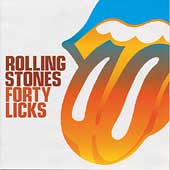
Every one has its own different flavour. Usually throughout a tour we are trying to get something extra in. This current tour particularly is a quantum leap really and we seem to have everything down together. There are so many things to put together, the lights, the sound, the stage, all kinds of things. The planets this time seem to be in the right alignment. I've got the best soundman I've ever had in my life I believe. I'm actually going to buy him.
The band can hear what the people are hearing and somehow we've achieved that.
When you play to 40 or 50 thousand people you have to figure out how to reach out and maybe change the configuration and the space because you've only got so much to work in. I still think we are getting there, I don't think we're there yet, although I don't know where the 'there' is. Wherever the 'there' is, we're getting there.
Everybody is feeling real good and looking forward to coming down south.
Well you can guess we are looking forward to seeing you. You know, it was 40 years ago that I remember seeing you play in the Civic picture theatre in Auckland.
Man, you've been around.
And you haven't? But we're still here.
We are. Maybe that was the tour we played Dunedin. We've never forgotten that. It was classic. We were on the other side of the world and we were in Scotland, Aberdeen on a Sunday. Wow. But we love you guys.
Keith, does it help that you are out now on the back of an album where the critical consensus is that A Bigger Bang has reconnected with the spirit of the Stones, or what we as listeners understand that to be? Do you see some truth in that, that A Bigger Bang is something special in your long career?
I don't know to be honest. We hate to analyse ourselves and we don't talk about it amongst ourselves, but the general consensus is that we've hit another level as a band playing together. It seems a lot of fog has been blown away and it's all very clear to us now what we are. Charlie Watts is the most amazing drummer in the world, I'd play for nothing to just play with him. It's amazing to stand in front of him and hear those sparse, simple and beautiful rhythms. It's killing me, so I'd do it just for him.
But the whole band feels the same way. Maybe we just suddenly got blessed and everything has fallen into place at the right time. I'm touching wood when I say this.
It seemed on A Bigger Bang there were aspects of the Stones we'd heard down the years, but it also sounded a whole lot more fresh than some of your previous albums. 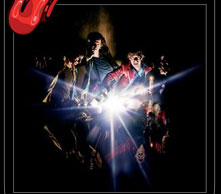
A lot of it's the fact we didn't cut it in the studio. There's always the feeling with the Stones, most of having been expelled at some time or other, that when you go into a recording studio as it were with glass booths and all of it you feel like you are going to school. The Stones are much better recorded in the way we did this time which was just in the house where nobody really thinks about being recorded.
There is always that schoolboy thing about the Stones like, 'Oh God, we're in a real place and people are watching' which inhibits us sometimes.
I find it much easier with the Stones to get a good track out of them when they are just sitting around on a couch and they sort of don't know it's happening. Maybe the secret is that the only good Stones records are those where people are spying on them and they don't know it.
Let me ask you about another couple of albums that came out recently, there was the Live Licks double CD and then more recently that Rarities album which came out through Starbucks. 
Oh yeah Rarities, the Starbucks thing. Yeah, you've kind of got to deal with the music business and I guess we are all exploring different ways . . . I mean, you make some music, you make a record, and how do you get it to the public? Right now everything is in a state of flux.
The question is, is it necessary to make an album or do you just come up with three or four good tracks and put them out over the internet? The Starbucks thing was another experiment in how to market the stuff, and also to put out stuff that would have been left behind in the rush to make an album. You've got all this other good stuff which you put in a can, but what do you do with it? If it's good it's always there. But in a way, the Starbucks thing we were all amazed by actually, like, 'Is that me Ronnie or is that you?'
Sometimes it must be hard to remember.
Yeah, but in some ways that album encouraged the band to think in new ways about how to get music from the producer to the consumer.
Are you involved much in pulling together something like Rarities or Live Licks, because I can't image you want to sit down after a tour and listen to six versions of Under My Thumb to decide which should go on an album.
Yeah, I know what you mean. Actually, it's not that difficult for me to listen to six versions of Under My Thumb because I know they'll all be different. But the only way you can really do it is somebody is on the job and they send you their idea of it and you listen to it, and then I ask Mick what he thinks about it or whatever. We just keep an ear on it in a way, rather than being totally involved. Because you don't have the time, and it's also very interesting to hear what some other person gets who has gone through the cans and said, 'How about that?' Sometimes it's interesting what people pull out and you go, 'Yeah man, that one would have just sunk into the bog if you hadn't have pulled it out'.
You said an interesting thing then, that you don't have the time. See, I would have thought that when you are off a tour you would have time. But I spoke to one of your neighbours Ronnie Spector the other day about her new album [Last of the Rock Stars] on which you play . . . 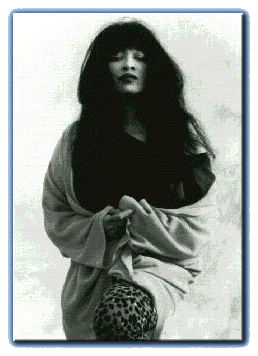
Ronnie, yeah! Bless her. That's my girl.
She said you are the kind of person she could just ring and you would be there. It strikes me that when you have downtime from making music you go out and make music. No rest for the wicked? Are you constantly working even when you are not being a Rolling Stone?
In a way you do just go back home and it's the family and the dog and all of that, put the cat out. But usually what happens is there is always somebody around who knocks on the door and is a player. Whoever is in town might come around and we sort of start to play together and it ends up as something very loose. I never plan things because every time I make a plan it goes shot. I feel a bit like a magnet because if anybody is around they gravitate towards me and we end up playing loads of different ideas and I play with different guys. I have a little -- well, it's not a studio it's actually a bar downstairs. But we've put up a few microphones and people come around. I get lots of ideas down there, but it's very casual. As you can imagine.
Are you a person who can say no to people?
It depends on how they come on.
Another couple of final things because I know you are busy. Pirates of the Caribbean, has that happened? [Richards clearly mishears the question]
Once again I touch wood, so far this tour has been the sweetest and most fun we've done. And the most consistently interesting musically and soundwise. It's been a real joy up to now, and I'm waiting for the other shoe to drop.
Another quick one. There is an interesting art exhibition happening here at the moment, it is of British art of the 60s with lots of iconic photographs of the Beatles and yourselves. Was there ever a moment back in that period when you actually thought that this stuff -- these songs, these album covers and so on -- were actually going to outlive their period.
I dunno. Probably more felt it than thought about it to be honest, because being in it you were like you couldn't see the woods for the trees. But it didn't take long to realise there was a certain concentration of energy there at the time which seemed to be very spontaneous and we all know the results. But at the time we were probably too busy to have thought it through to think you were part of a special time or generation in life. It was a very exciting period, but then what isn't when one week you are on the dole and then suddenly you are making 50 quid a week!
There was excitement in many different ways, and then, 'You mean I can actually make a living out of what I want to do?' That to me was the most amazing thing to me. Shit, I'd be doing this even if I was in my shed, if it had never happened I'd still be doing it.
There was an amazing feeling in the early 60s -- and I guess it was all to do with being war babies or something -- and we were just reaching out and growing up with the Beatles and ourselves. And it wasn't just us, it was happening all over the place, like nasty rash breaking out.
At the same time you didn't think it was going to be historic. You were too busy making history to think about it. 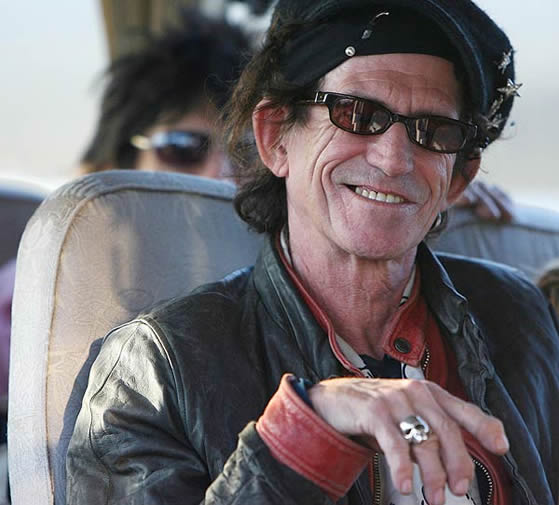
They always say soldiers never know what goes on in a war because they have their heads down in the trenches, the people who know are generals well away from the battle.
Right.
Couple of last quick ones. Do you take much interest in contemporary music? For example do you hear albums by Franz Ferdinand, the Strokes or Radiohead?
I listen here and there and I've been watching a few new bands. There are loads of good musicians out there and there is a lot of variety, it's the music business that is going to be the problem for any musician or new band. The business people don't know what the hell they are doing. In a way that's good because it makes it a free-for-all and so good things might come out of it. I have no problems with the music but I do have a problem with the music business because they want to keep their hands on everybody, but at the same they time are dinosaurs. So there's the whole thing about getting music from A to B.
One of the ways that people do it is to actually get out and play for people, like you do.
That's the secret I didn't want to tell anybody. You've just got to get out there and find a bunch of people who want to hear it and sweat it out every night, there's no substitute for playing music live to people.
Keith, last one. I'm going to read you a quote. You know what this is like in school, someone exam question and there is the word 'discuss' afterwards. Can we try that about this quote: Noel Gallagher of Oasis said yesterday -- have you heard this? 
Lay it on us.
He said that you, the Stones, can't understand why people don't take your new records as seriously as your old ones. He said you are old age pensioners and by all means make records and go on tour because if people want to see, fine. But don't expect to be taken seriously, your best work is behind you.
Did I say that? 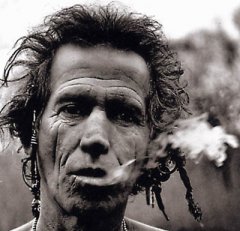 No, Noel Gallagher from Oasis.
No, Noel Gallagher from Oasis.
Oh. Well, what would he know? Every time I hear from the man he's a pain in the arse. He keeps looking for a fight, and I will let him have it one day and he won't expect it. But anyway, bless is 'eart. He's only got one way to go.
Keith, thanks for your time.
A pleasure. You coming to the show?
Of course, I'll be way up the back in the nosebleed area.
Well, pop round afterwards. Come to the tradesman's.
For much more on Richards and the Rolling Stones start here.

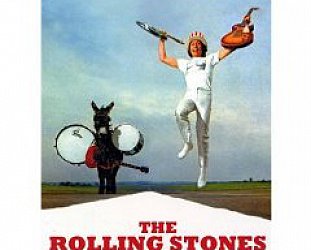
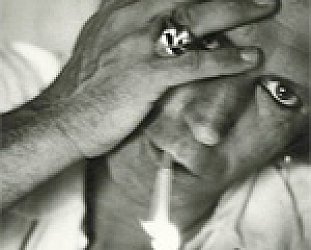
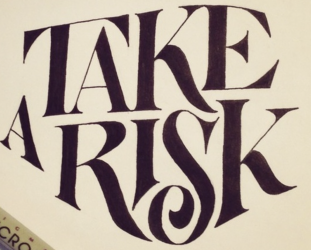
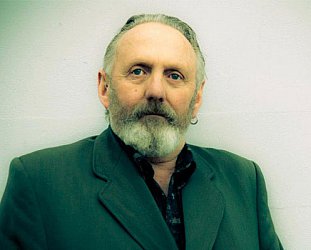
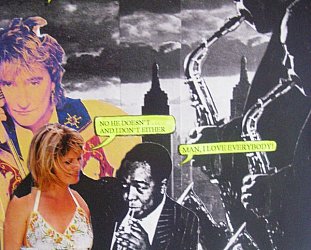

post a comment